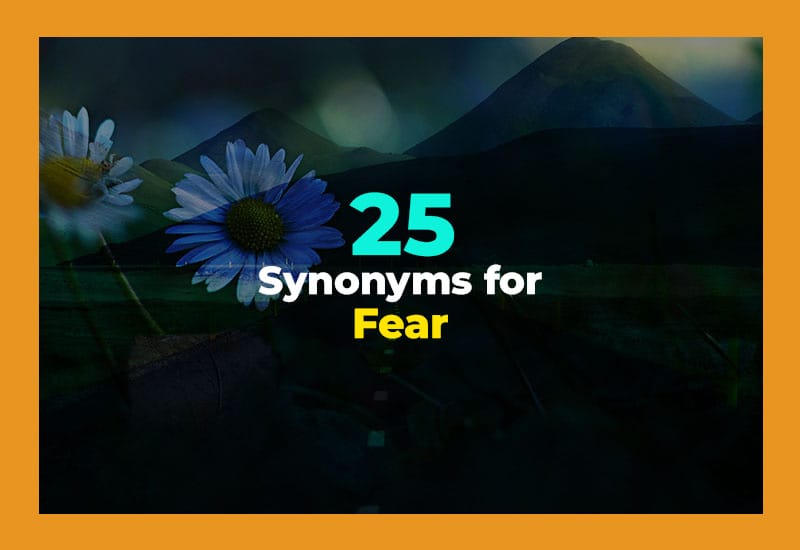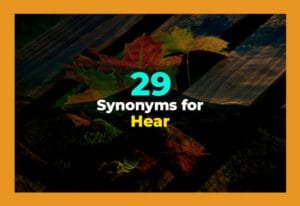You know that feeling when your heart races and your stomach twists? That's fear talking! Whether it's worry, panic, or just a little nervousness, fear comes in many shapes. Today, let's explore some fun and easy words that mean fear. These words can help you describe exactly how you feel, from small jitters to big terror. Ready to learn new ways to say "fear"? Let's dive in and make talking about fear a bit easier and way more interesting!
1. Anxiety
Anxiety is a kind of fear that makes you feel worried or nervous about something that might happen. It often makes your heart beat faster and your mind race. ‘She felt anxiety before the big test.’ Anxiety can be small or big, but it usually stays in your mind for a while. People can have anxiety about things like exams, meetings, or even talking to others. It's normal to feel this way sometimes. When anxiety is strong, it can be hard to focus or sleep. Talking about it helps many people feel better and less scared.
2. Panic
Panic is a sudden, strong fear that makes your body feel out of control. It can happen quickly, like during an emergency. ‘He felt panic when he saw the fire alarm.’ People often breathe fast, sweat, or feel dizzy in panic. Panic makes you want to run away or hide. Sometimes panic can happen without a clear reason, called a panic attack. When panic hits, it's important to stay calm and breathe slowly. Panic is fear in its strongest form, but it usually passes once you feel safe again.
3. Terror
Terror is a very strong and intense kind of fear. It usually happens when you are in real danger. ‘The loud thunder caused terror in the little children.’ Terror makes you feel frozen or want to escape fast. It's a scary feeling that can last a short time but feels very powerful. You might feel terror during a storm, accident, or when you see something frightening. This kind of fear is natural and helps keep you safe by warning you to be careful or run away.
4. Dread
Dread is a heavy feeling of fear that something bad will happen. It's like worrying about the future and feeling uneasy. ‘She felt dread before her doctor's appointment.’ Dread can make it hard to sleep or focus because your mind keeps thinking about the bad thing. It's not always about big dangers; sometimes it's about small but important worries. When you have dread, you might try to avoid the situation or feel sad. Talking to friends or family can help make dread feel less scary.
5. Fright
Fright is a quick and sudden fear caused by a surprise or shock. It happens when something unexpected scares you. ‘He got a fright when the cat jumped on him.’ Fright usually lasts just a moment but feels strong. It can make your heart beat fast and your eyes wide open. Fright helps you react quickly to danger, like jumping away or shouting. It's a natural feeling that everyone has sometimes. After the fright, you might laugh or feel a little shaken, but it usually goes away fast.
6. Alarm
Alarm is a warning feeling of fear that tells you something is wrong or dangerous. ‘The strange noise gave her alarm.’ It makes you alert and ready to act. Alarm is like a signal in your body that says "pay attention!" When you feel alarm, your senses get sharper, and you might feel tense or nervous. It helps protect you from danger by making sure you don't miss warning signs. Alarm can come from real problems or from worries that might not be true, so it's good to check carefully what's causing it.
7. Horror
Horror is a very strong fear mixed with shock and disgust. It happens when you see or hear something very scary or disturbing. ‘The horror movie made him cover his eyes.’ Horror makes your body feel tense and your mind feel upset. It's more than just being scared—it also feels awful or sickening. People often use horror for things like scary movies, accidents, or bad news. This kind of fear can stay in your memory for a while. Talking about horror can help you feel better after seeing or hearing something scary.
8. Worry
Worry is a gentle kind of fear that makes you think about bad things that might happen. It's a slow feeling that can last a long time. ‘She was full of worry about her sick dog.’ Worry makes your mind busy and sometimes stops you from enjoying the moment. People worry about school, health, or family. Worry can help you prepare, but too much worry can make you feel tired or sad. When you worry, it's good to take breaks and talk about your feelings with someone you trust.
9. Nervousness
Nervousness is a feeling of fear mixed with excitement or worry. It happens before important events like tests or performances. ‘He felt nervousness before his speech.’ Nervousness can make your hands shake or your stomach feel funny. It's normal and often helps you get ready. Sometimes nervousness makes people smile or laugh when they are shy. If you feel nervous, try taking deep breaths or practicing what you will do. Nervousness usually goes away once you start the activity or feel more confident.
10. Apprehension
Apprehension is a quiet, small fear about something you think might happen. It's like a feeling of doubt or worry. ‘There was apprehension about the upcoming storm.’ Apprehension can make you feel cautious or careful. It helps you think before acting. Sometimes apprehension stops people from trying new things because they feel unsure. But it can also protect you from risks. When you have apprehension, it's good to talk about your fears and get support. This can help turn your fear into courage.
11. Unease
Unease is a feeling of discomfort or mild fear. It means something feels not right or unsafe. ‘She felt unease walking alone at night.’ Unease makes you alert and watchful, like your body senses danger. It's not a strong fear but enough to make you worried or nervous. Unease can happen in new places, around strangers, or when things change suddenly. It's a good feeling because it helps you stay careful and protect yourself. When you feel unease, trust your feelings and stay aware of your surroundings.
12. Concern
Concern is a gentle fear mixed with care about someone or something. It means you want to keep things safe and good. ‘He showed concern for his friend who was sick.’ Concern can make you want to help or fix a problem. It's different from panic because it's calm and thoughtful. Concern is a normal feeling when you care about family, friends, or your own health. It helps people stay responsible. When you feel concern, it's good to listen and act kindly to make things better.
13. Trepidation
Trepidation is a feeling of nervous fear about something that might be hard or dangerous. ‘She felt trepidation before starting her new job.’ It's stronger than worry but not as strong as panic. Trepidation makes you slow down and think carefully. People feel it before big changes or unknown situations. It's normal to feel trepidation because it helps you prepare and be cautious. Talking about your fears can help turn trepidation into confidence. It shows you care about doing things well, even if you feel a bit scared.
14. Scare
A scare is a quick fear caused by a sudden surprise or shock. ‘The loud noise gave me a big scare.’ It's usually short and goes away fast. Scares happen when something unexpected happens, like someone jumping out or a sudden loud sound. It makes your heart beat fast and your body jump. Scares are normal and happen to everyone. Sometimes they are funny, like in Halloween games, but other times they warn you of real danger. After a scare, you might laugh or feel relieved that everything is okay.
15. Shock
Shock is a strong feeling of fear and surprise at the same time. It happens when something sudden and unexpected occurs. ‘She was in shock after hearing the bad news.’ Shock can make you feel numb or unable to react. It's a mix of fear and confusion. People feel shock after accidents, bad news, or scary events. It can take time to understand what happened when you're in shock. Talking to friends or family helps people recover from shock. It's a natural response to very big or sudden changes.
16. Hesitation
Hesitation is a small fear that makes you pause before doing something. ‘There was hesitation before he jumped into the water.’ It means you feel unsure or worried about what might happen. Hesitation can protect you by making you think before acting. But too much hesitation can stop you from trying new things. It's normal to hesitate when something feels risky or new. When you feel hesitation, it's good to take a moment, breathe, and decide if you want to try. It's okay to be careful.
17. Cowardice
Cowardice means being very afraid and not wanting to face danger or problems. ‘Some say cowardice is not trying because of fear.’ It is a stronger word and sometimes used to describe someone who runs away from trouble. But everyone feels scared sometimes, and that's okay. Cowardice shows when fear stops a person from acting bravely. It's different from normal fear because it often means avoiding responsibility. Understanding fear helps us be brave, even when we feel scared. Courage isn't about never being afraid—it's about acting even when fear is there.
18. Anxiety Attack
An anxiety attack is a sudden strong feeling of fear that can be very scary. ‘She had an anxiety attack before the big presentation.’ It can make your heart race, make it hard to breathe, or make you feel dizzy. Anxiety attacks happen when fear gets too strong very fast. People might feel like they can't control their body. It usually lasts a few minutes but feels very real. If you or someone you know has anxiety attacks, deep breathing and calm thoughts can help. Talking to a doctor or counselor is also a good idea.
19. Afraid Feeling
An afraid feeling is a simple way to say you feel scared or worried. ‘He had an afraid feeling when walking in the dark.’ It's the basic kind of fear everyone knows. This feeling tells you to be careful or watch out. It can be small or big, depending on the situation. Afraid feelings help protect you from danger. When you feel afraid, your body might tense up or your heart beat faster. It's normal and natural. Sharing your afraid feelings with someone you trust can make you feel safer and less alone.
20. Nightmares
Nightmares are bad dreams that cause fear while you sleep. ‘She woke up scared from a nightmare about monsters.’ Nightmares can make you feel worried or scared even after waking up. They happen when your brain is trying to deal with fears or stress. Nightmares are common and happen to kids and adults. If you have a nightmare, try to remember it's not real and talk about it with someone. Good sleep habits and relaxing before bed can help reduce nightmares and make your nights more peaceful.
21. Distress
Distress means strong fear mixed with pain or sadness. It happens when you feel worried or upset about something serious. ‘He was in distress after losing his wallet.’ Distress can make you feel helpless or scared about a problem. It's more than just fear—it also has a feeling of trouble or hurt. People can feel distress during emergencies, illness, or big changes. When you feel distress, it's important to ask for help. Talking or resting can make distress easier to handle and help you feel safer again.
22. Discomfort
Discomfort is a mild fear that feels like being uneasy or not relaxed. ‘She felt discomfort walking through the dark alley.’ It's a warning feeling that something is not quite right. Discomfort can be physical, like pain, or emotional, like worry. It helps you notice dangers or problems early. Discomfort is usually small but important because it keeps you aware. If you feel discomfort, it's good to pay attention and maybe change what you're doing. Discomfort helps keep you safe by telling you when to be careful.
23. Jitters
Jitters are small, nervous feelings that happen before something important or scary. ‘He had the jitters before his job interview.’ Jitters make your hands shake or your stomach feel funny. It's a mix of excitement and fear. Many people get jitters before performances, exams, or speaking in public. Jitters show you care and want to do well. To calm jitters, take deep breaths and practice. After a while, jitters usually go away and you feel more confident. Jitters are a natural part of facing challenges.
24. Goosebumps
Goosebumps are a physical reaction to fear or cold, where your skin gets tiny bumps. ‘She got goosebumps during the scary movie.’ It's your body's way of reacting to strong feelings like fear or surprise. Goose
bumps happen when your body prepares to protect itself. You might also feel chills or shivers. Goosebumps can happen with excitement too, like hearing a beautiful song. They show that your body and mind are connected and respond to emotions. It's a natural and normal sign of feeling scared or amazed.
25. Nervous Tension
Nervous tension is a feeling of tightness in your body caused by fear or worry. ‘Before the game, he felt nervous tension in his shoulders.’ It makes muscles stiff and your mind restless. Nervous tension happens when you expect something hard or scary. It helps you stay alert but can be uncomfortable. People feel nervous tension before tests, speeches, or important decisions. To reduce nervous tension, try stretching, breathing exercises, or relaxing your muscles. Understanding nervous tension helps you manage fear and stay calm in tough situations.

Final Thoughts
Fear is a natural feeling everyone experiences. It helps protect us from danger and keeps us safe. By using different words like anxiety, panic, or dread, you can better express how you feel. Each type of fear has its own role and way of affecting us. Understanding these feelings can help you handle fear in a healthy way. Remember, fear is normal, but it should not stop you from living your life fully. Talking about fear and facing it with courage makes you stronger every day.









